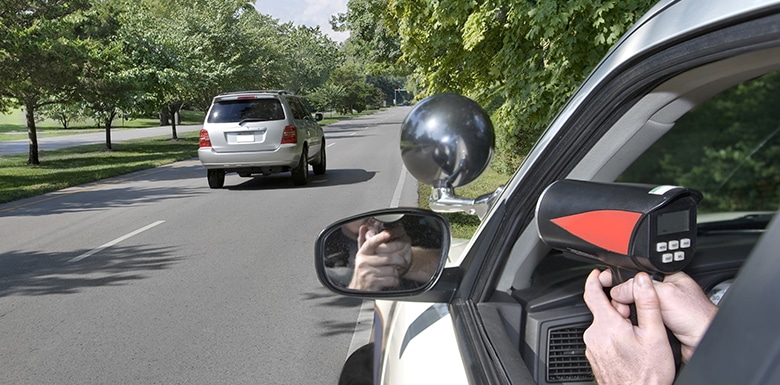Radar Enforcement in PA : More Tickets to Fill City Coffers
Jun 28 2019, by in Legal Blog, Traffic Defense
For nearly 60 years, radar has only been available to Pennsylvania State Troopers for enforcing speed limits. And while PA is currently the only state to ban local police from using radar enforcement technology, Senate Bill 607 – sponsored by Senator Mario Scavello – may change that.
The ban originates from trepidation around small towns using radar to set up speed traps as a way to generate revenue and a discrepancy in police training among municipalities at the time. Over the years, this training gap has certainly dissipated, but the fear about abusing radar to generate funds has not. However, that has not stopped local police departments from trying repeatedly to lift the ban, claiming the alternatives are not as accurate, and that by giving radar to local cops, it will slow drivers and save lives.
What are the Pros of Using Radar in PA?
Putting radar in the hands of local police has long been a priority. Supporters say radar will reduce human and mechanical error when recording speeds, allow enforcement in places that are not conducive to other methods – but where speeding would be very dangerous and allow officers to detect speeders without having to set up elaborate, often expensive equipment.
This sentiment was highlighted by Rep. Greg Rothman, R-Cumberland County to Penn Live, “nobody likes getting a speeding ticket, but the reality is high traffic speeds are a huge cause of accidents and death,” Rothman said. “We want to allow the police to use the best tools to keep people safe.”
Rothman put forth a measure for a six-month pilot program for using radar and also referenced a few provisions to hopefully quell fears about local speed traps and financial abuse:
- Only officers who have completed an approved training course can operate the devices and must get re-certified every three years.
- Roads entering the community must post “Radar Enforced” speed limit signs to notify motorists.
- Officers must be in marked cruisers, and motorists can only be ticketed if they exceed the limit by at least 10 mph.
- Revenue generation from tickets would be capped and banned from setting quotas so as not to incentivize speed traps.
Is Radar Enforcement in PA Moving Too Fast?
Yes, it is true that no one likes getting a ticket, and nothing will change that. While this new bill may appear a long time coming, especially when you consider that Pennsylvania is the only state that doesn’t let local cops use radar, it still has issues and the flood of new tickets will (even with caps) create a lot more revenue. We should still be wary and be prepared to fight unjustified tickets, whether they are from a trooper or a local officer.
First, we should point out that radar detection is not as precise as it is being made out to be. This technology is actually old – WWII old. While it is a long-established tool used across the country, through my experience in traffic courts across Pennsylvania, I have seen firsthand how radar guns can fail or display wildly inaccurate results if they are not properly calibrated or due to human error.
What Prevents For-Profit Speed Traps?
Next, there is the financial concern. While there is a proposed cap on how much revenue can be generated from radar-enforced speeding tickets, the details are shaky. Will this apply to any ticket that uses radar? Police departments are known to be creative when it comes to their budgets. After all, with new equipment and training comes cost. Will the expenses be recouped from the fines collected? Even if excess funds are given to the state, they will be applied to traffic safety programs like grants for local enforcement.
If the program was not about making money, why wouldn’t the proposal be to eliminate the fines altogether in favor of automatically applying points to driver’s licenses? The deterrent of points and an insurance hike would still be there, but then your local municipality would not get their slice of the pie.
Remember, the state, county, and city share money collected from fines, so what’s good for one is good for all of them. A speeding ticket in Pennsylvania means a fine of at least $35, which only increases depending on the road, your rate of speed, and other fees. This typically reaches $150 or more, and with over 650,000 speeding tickets issued by Pennsylvania troopers since 2014, it should come as no surprise that local departments want a more efficient tool at their disposal.
The state Senate approved the bill on Tuesday, June 25, 2019, and at this point, it will move on the House. Regardless of how radar enforcement in PA shakes out, if you are ticketed for speeding, it is always in your interests to discuss your options with an experienced attorney before just handing money over.
Attorney Michael Fienman provides aggressive and effective representation to individuals in Philadelphia, Bucks County, Delaware County, and Montgomery County who have been accused of crimes in state court, federal court, and before administrative agencies. Representative cases include driver licensing matters, traffic violations, DUI, summary offenses, misdemeanors, major felonies, and white-collar criminal charges.


